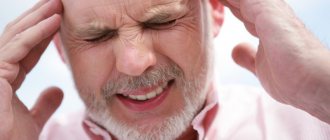Causes of depression in older people
Senile depression develops as a result of a number of physiological and social factors affecting a person. The first include:
- Disturbances in the functioning of the nervous system associated with age-related changes.
- The presence of diseases that worsen physical well-being, are accompanied by pain and limit the capabilities of older people.
- Abuse of drugs leading to the development of depressive conditions.
Social factors that increase feelings of depression include:
- Narrowing circle of friends and the emergence of a feeling of uselessness due to retirement.
- A feeling of loneliness that is more common among older women suffering from empty nest syndrome.
- Dissatisfaction with life lived.
Risk groups and types of depression
Not all older people should be concerned about developing depression. The first risk group includes:
- Older women.
- Lonely people regardless of gender.
- Men and women with problems with alcohol and drugs.
- Elderly individuals who have previously attempted suicide and have been treated for depressive disorders.
- Old people experiencing a stressful situation.
- Having a severe somatic illness or physical defect.
- Genetically predisposed to the development of depression.
There are several types of depression:
- Psychogenic depression develops under the influence of personal problems.
- Somatic mental disorders appear as a result of a serious illness that requires a long stay in a hospital.
- The cause of organic psychological disorder is congenital or acquired diseases of the nervous system.
- Iatrogenic depressive disorders are a reaction to uncontrolled use of medications and incorrect diagnosis.
- Endogenous depression is formed under the influence of several factors (genetic predisposition, internal changes and external influences).
Causes of depression in old age
The manifestation of the disease is most often observed in the first month after a person retires. A radical change in lifestyle, acquiring a new social status is a serious stress for men and women. A previously busy and in-demand professional is deprived of his usual living conditions. A person no longer needs to wake up early and strictly adhere to a daily routine. A pensioner stops living at his usual pace; he does not need to plan his work day, write down tasks step by step, or draw up reports. Lack of workload means extra free time, but the newly minted pensioner does not know how to use it profitably. Often he suffers from idleness and does not find ways to implement his existing knowledge and skills.
Retirement also involves a significant change in social activity. With the cessation of work, a person’s social circle is reduced and the number of contacts decreases. Partial social isolation of people in older age groups is often associated with the death of close friends, a spouse, or a relative. Loneliness that hits a previously active person is a direct path to the development of depression in older women and men.
Depression besets aging parents with many children who have dedicated their lives to caring for the younger generation. When their children and grandchildren become adults and leave the “family nest,” older people experience acute loneliness and become despondent.
Another reason for the formation of symptoms of affective disorders is a significant deterioration in a person’s financial situation upon retirement. Unfortunately, in the post-Soviet space the size of pensions cannot always meet the needs of an elderly person. A pensioner often experiences financial difficulties, cannot afford to buy quality food, and is worried about the lack of money to purchase expensive medicines. Thinking about the lack of finances is a direct path to depression and a gloomy mood.
An aspect that negatively affects a person’s psycho-emotional state is a lack of physical activity . Some elderly people enroll themselves in the ranks of the “old people” and “disabled people” ahead of schedule. They believe that the more time they spend relaxing on the couch, the better they will feel. Many people after 60 years of age do not exercise, do not spend enough time walking in the fresh air, and refuse to play sports.
Common causes of depression in old age are somatogenic and iatrogenic factors. In people over 60 years of age, chronic diseases worsen, neurological defects progress, and immunity deteriorates, which makes them defenseless against viral and bacterial infections. Many diseases of the internal organs and nervous system are accompanied by severe depressive symptoms.
Symptoms of depression in older people are determined by the following pathological conditions:
- atherosclerosis;
- acute disorders of cerebral blood flow;
- vascular malformations;
- vascular aneurysm;
- metabolic encephalopathies;
- benign and malignant brain tumors;
- diabetes mellitus;
- hyperfunction and hypofunction of the thyroid gland.
Affective disorder can be triggered by taking certain medications taken in the treatment of the underlying disease. The following can provoke the development of symptoms of depression in older women and men:
- beta blockers;
- calcium channel blockers;
- some analgesics;
- drugs with hypnotic effects;
- tranquilizers and certain antipsychotics.
Older men often suffer from chronic alcoholism, and symptoms of depression appear as a result of alcohol abuse.
Signs and diagnosis of senile depression
Aging and the changes associated with it are natural processes that all people experience. Most older people experience symptoms of depression, which, without proper attention, can lead to severe mental and physical health problems in older people. Depression in an elderly person has the following manifestations:
- Sudden changes in the emotional background. The mood of old people changes from depressed, accompanied by slow and quiet speech, sluggish facial expressions, to excited with sharp emotional outbursts, irritation and dissatisfaction with the surrounding reality.
- Increased anxiety, manifested in the desire to constantly control your loved ones through telephone calls and personal presence. Fears arise for the life and health of loved ones.
- Pathological hoarding, manifested in the refusal to throw away old things or replace them with new ones.
- Reduced activity and narrowed circle of friends and interests.
- The presence of obsessive thoughts about uselessness and guilt towards relatives for one’s existence. In some cases, older people accuse loved ones of lack of attention and care. In severe forms of depression, suicidal tendencies may occur.
- Complaints of poor physical health, lack of appetite, sleep problems and increased fatigue, accompanied by headaches.
- Impaired memory and concentration.
Depression in older people often becomes chronic. This is due to difficulties in diagnosing the disease:
- Therapists confuse symptoms of depression with manifestations of various diseases characteristic of older people.
- Representatives of the older generation often pay attention to the physiological manifestations of the disease, not attaching importance to psychological difficulties.
- Close people do not attach importance to the elderly’s complaints about poor health.
- Only a psychotherapist can diagnose depression, to whom older people do not turn because of mistrust or fear of public reproach and social isolation.
Diagnosis of a depressive state occurs during a conversation between a specialist and a patient. An important condition for the correct diagnosis and effective treatment of depression is the establishment of a trusting relationship between the psychotherapist, the elderly person and his family.
Treatment methods
The treatment program for depression in the elderly includes the following methods:
- Conversations between a specialist and the patient and his relatives.
- Changing your lifestyle and creating positive habits.
- Taking medications (mild antidepressants for older people).
- The use of traditional medicine as an auxiliary method of treatment.
Healthy lifestyle
Strong physical activity helps improve the mental and general tone of the body of elderly patients.
The most popular types of physical activity among the older generation are:
- Hiking.
- Swimming lesson.
- Yoga.
- Dancing.
- Bicycle rides.
- Work in the garden or vegetable garden.
You should also reconsider your eating habits. Include more cereals, vegetables, fruits, lean fish and meat in your diet.
Traditional treatment methods
Traditional treatments for depression include medications and psychotherapy.
It is important to understand that only a specialist can prescribe a drug that is completely suitable for the patient and takes into account the characteristics of the treatment of concomitant diseases. Self-administration of antidepressants can lead to increased depression.
The success of psychotherapy depends on the patient’s desire to make contact with the doctor and the strict implementation of his recommendations. An important component of treating depression in the elderly is the active participation of the patient's family in the process; Poor relationships with family increase depression.
Traditional medicine recipes
The use of various medicinal herbs that have a sedative effect in the treatment of depression helps to safely relieve nervous tension and anxiety. Infusions of St. John's wort, mint and lemon balm, chamomile, motherwort and valerian have a positive effect on the nervous system.
Before starting to take herbal remedies, you should consult your doctor.
Treatment options
Treatment of people with depression is the responsibility of a psychiatrist. In severe cases of the disease, patients are admitted to the hospital. The mild form allows treatment at home.
A combination of medication and psychotherapy is considered appropriate. They act very carefully when it comes to medications, because doctors need to achieve a therapeutic effect and minimize the risk of complications or side effects, which are most often observed in old age. For this reason, the doses of drugs are reduced by 2-3 times (compared to the treatment of young people), and the dynamics and general condition of the patients are carefully monitored. Drugs should also be selected taking into account compatibility with other drugs that the patient takes to treat other diseases.
Psychotherapy works well in treating depression. It involves holding confidential conversations, changing your daily routine, and doing what you love. It’s good to have a clear example of a person who struggled with depression and overcame it.
You can add art therapy classes. It is important to switch the patient from one condition to another. Find him a “field” for new bright thoughts, inspiration and ideas.
Drug treatment
Drug treatment is resorted to only in difficult situations, when the patient completely “dissolves” in his negative thoughts, refuses to eat and drink, suffers from anorexia, and “replays” suicidal thoughts in his head. In such situations, only a specialist - a psychotherapist or psychiatrist - can prescribe drug treatment. For this, antidepressants are used (Citalopram, Fevarin, Sertraline and others).
At first, relatives need to prepare themselves for the fact that they will have to constantly explain the need to take pills, show persistence and tolerance. Medicines must be given on schedule. If necessary, you will need to deceive, hide the pills and do everything so that the patient actually drinks them (without even knowing about it). In this case, the effect will come quickly. After 2-3 weeks, the patient will be able to treat himself adequately, feel relief and take medications on his own.
If the effect does not occur, and the state of physical health worsens, then it is necessary to contact a therapist and specialized specialists, and also get a second consultation with a neurologist and psychiatrist.
Recommendations for loved ones
Overcoming depression is impossible without attention and care from the family. An elderly person should not feel like a burden to their loved ones. Any help he gives in household chores should be noted and thanked for it.
People of the older generation have a rich and interesting past, and they can tell young people a lot about it. Showing interest in events that happened to a grandparent in the past will boost their self-esteem.
Old age can become a time full of vivid impressions, interesting events and new acquaintances. With an active lifestyle, careful attention to your health and family support, depression will not affect older people.
Additional useful tips
In addition to taking medications (sometimes they decide not to prescribe them for now), behavioral therapy and psychotherapy are included. The care, attention and control of the patient falls on the shoulders of relatives.
There are a number of recommendations that will help you cope with this unpleasant disease as quickly as possible.
- During treatment, you need to take an elderly relative with you if he lives separately.
- It is necessary to create a daily routine so that the patient does not have free time and soul-searching.
- It’s worth connecting sports. Gymnastics, walking, and simple exercises at home are suitable. You can complement them with the company of like-minded people or just pleasant music.
- It is important to monitor your nutrition and create a diet. The diet should include more different fruits and vegetables. It is better to exclude fried, flour, spicy, smoked and other unhealthy foods.
- You can do what you love with an older person. Hide piercing and cutting objects. Don't leave him alone.
- It is recommended to remove medications, dangerous chemicals, and anything else that could harm oneself from the patient.
- More time should be spent with the ward in the fresh air.
- It is worth turning on calm melodic or just classical music more often.
- It is imperative to praise a relative who suffers from depression, even for any little thing.










